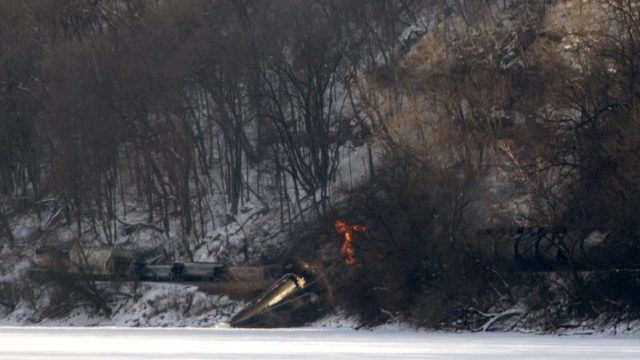Ethanol Train Derails And Catches Fire, Nobody Freaks Out

The boom in oil production in North Dakota and elsewhere, combined with political hostility to pipeline infrastructure, has led to a dramatic increase in the amount of oil being shipped on U.S. rails. And a few ugly, explosive derailments have resulted (rightfully so) in a lot of concern about the safety of oil-by-rail shipments.
Part of that debate has spilled over into new oil conditioning regulations in North Dakota aimed at reducing vapor pressure so that rail cars carrying Bakken crude will be less likely to explode. Or that’s the theory, anyway.
But what about the explosive nature of other sorts of liquids transported on rails? Like, say, ethanol?
Today a train derailed in Iowa. It then caught fire. Had it been a train carrying Bakken oil it would have inspired hyperbolic headlines and renewed protests from environmental activists. But it didn’t, because it was carrying ethanol not oil. And ethanol doesn’t have the political connotations oil does.
(Reuters) – Eleven railway cars carrying ethanol fuel derailed on Wednesday in a remote location north of Dubuque, Iowa, and three of them caught on fire, Canadian Pacific (CP) railway said.
There were no injuries in the accident involving an eastbound 81-car freight train, said Jeremy Berry, spokesman for the railway.A total of 12 railway cars derailed, and 11 of those were carrying ethanol, Canadian Pacific said in a statement.
This wasn’t an isolated incident. Ethanol trains derail and explode with about the same regularity as oil trains, it seems. There have been plenty of significant instances in recent years.
Like this one in Ohio from 2012:
COLUMBUS, Ohio – Exploding freight cars full of ethanol made for a dramatic early morning scene in Ohio’s capital on Wednesday, but officials said the train derailment that led to a hurried evacuation of an urban neighborhood could have been much worse.
The National Transportation Safety Board dispatched a 12-person team to investigate the derailment on the Norfolk Southern Corp. tracks, which led to spectacular explosions and the burning of three tank cars each carrying 30,000 gallons of ethanol.
And this one in Illinois in 2011:
Explosions shook the north-central Illinois village of Tiskilwa early Friday when a freight train loaded with highly flammable ethanol crashed and ignited, sending bright orange flames jetting skyward.
Capt. Steve Haywood of the Ottawa Fire Department said the train’s tanker cars were shipping ethanol and other materials for Decatur-based corn processor Archer Daniels Midland Co. when it derailed around 2 a.m. At least six tanker cars burned, he said. No injuries were reported.
“It was the tallest thing in town,” 19-year-old Dylan Carlson said of the flames, which he recorded from his home about four blocks away.
I could cite more examples, but I think you get the idea.
It’s perfectly valid to have a discussion about rail safety. It’s valid to have a debate about whether or not what we’re shipping on rails is safe to be shipped. But it very oftsen seems as though the debate over the safety of oil-by-rail shipments has more to do with a certain faction’s concerted efforts to choke off oil production than actual safety concerns.




